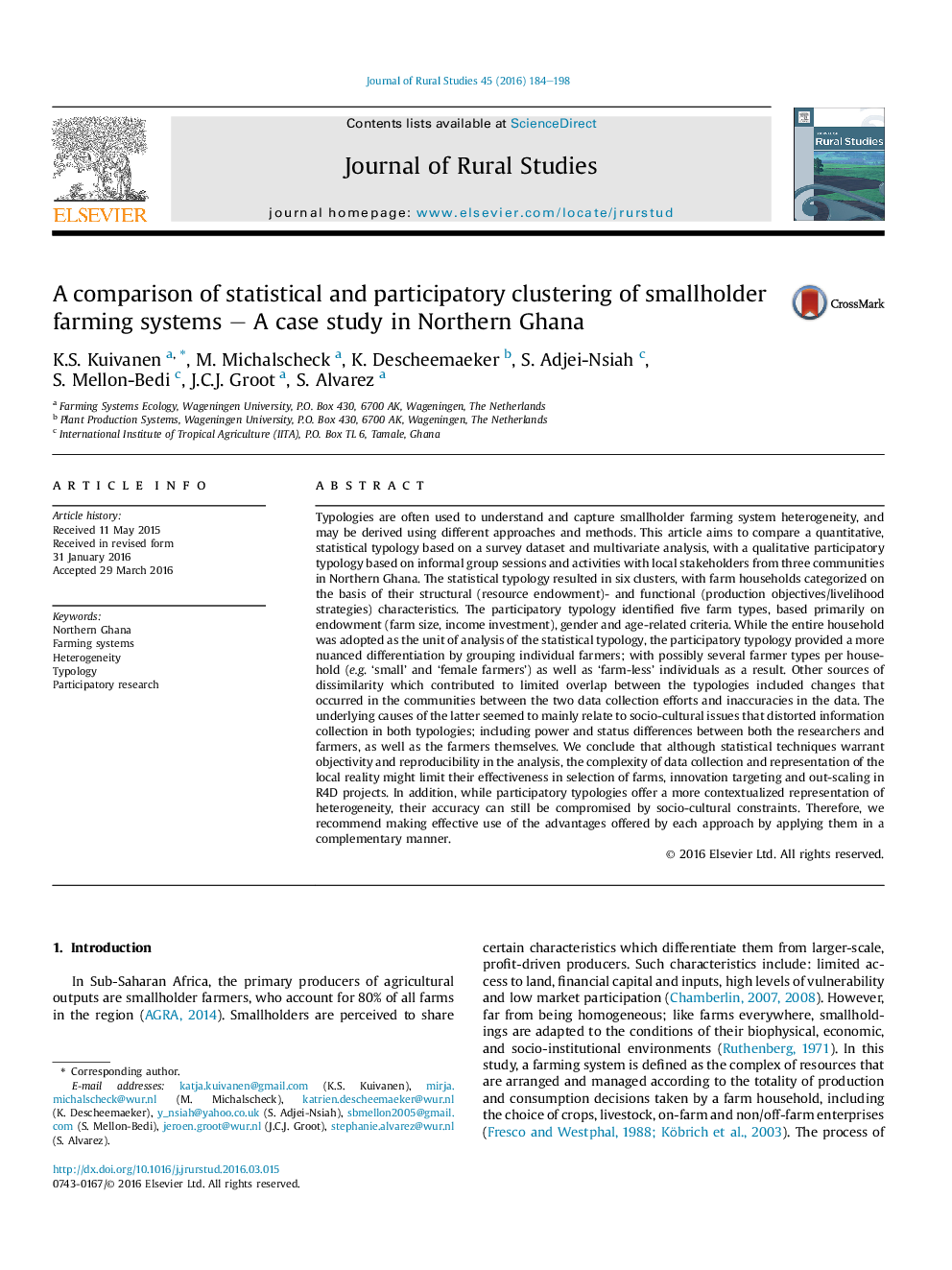| کد مقاله | کد نشریه | سال انتشار | مقاله انگلیسی | نسخه تمام متن |
|---|---|---|---|---|
| 6545420 | 159960 | 2016 | 15 صفحه PDF | دانلود رایگان |
عنوان انگلیسی مقاله ISI
A comparison of statistical and participatory clustering of smallholder farming systems - A case study in Northern Ghana
ترجمه فارسی عنوان
مقایسه خوشه ای آماری و مشارکتی سیستم های مالی سرپناه - مطالعه موردی در شمال غنا
دانلود مقاله + سفارش ترجمه
دانلود مقاله ISI انگلیسی
رایگان برای ایرانیان
کلمات کلیدی
شمالی غنا، سیستم های کشاورزی، ناهمگونی، گونه شناسی، تحقیق مشارکتی،
موضوعات مرتبط
علوم زیستی و بیوفناوری
علوم کشاورزی و بیولوژیک
جنگلداری
چکیده انگلیسی
Typologies are often used to understand and capture smallholder farming system heterogeneity, and may be derived using different approaches and methods. This article aims to compare a quantitative, statistical typology based on a survey dataset and multivariate analysis, with a qualitative participatory typology based on informal group sessions and activities with local stakeholders from three communities in Northern Ghana. The statistical typology resulted in six clusters, with farm households categorized on the basis of their structural (resource endowment)- and functional (production objectives/livelihood strategies) characteristics. The participatory typology identified five farm types, based primarily on endowment (farm size, income investment), gender and age-related criteria. While the entire household was adopted as the unit of analysis of the statistical typology, the participatory typology provided a more nuanced differentiation by grouping individual farmers; with possibly several farmer types per household (e.g. 'small' and 'female farmers') as well as 'farm-less' individuals as a result. Other sources of dissimilarity which contributed to limited overlap between the typologies included changes that occurred in the communities between the two data collection efforts and inaccuracies in the data. The underlying causes of the latter seemed to mainly relate to socio-cultural issues that distorted information collection in both typologies; including power and status differences between both the researchers and farmers, as well as the farmers themselves. We conclude that although statistical techniques warrant objectivity and reproducibility in the analysis, the complexity of data collection and representation of the local reality might limit their effectiveness in selection of farms, innovation targeting and out-scaling in R4D projects. In addition, while participatory typologies offer a more contextualized representation of heterogeneity, their accuracy can still be compromised by socio-cultural constraints. Therefore, we recommend making effective use of the advantages offered by each approach by applying them in a complementary manner.
ناشر
Database: Elsevier - ScienceDirect (ساینس دایرکت)
Journal: Journal of Rural Studies - Volume 45, June 2016, Pages 184-198
Journal: Journal of Rural Studies - Volume 45, June 2016, Pages 184-198
نویسندگان
K.S. Kuivanen, M. Michalscheck, K. Descheemaeker, S. Adjei-Nsiah, S. Mellon-Bedi, J.C.J. Groot, S. Alvarez,
